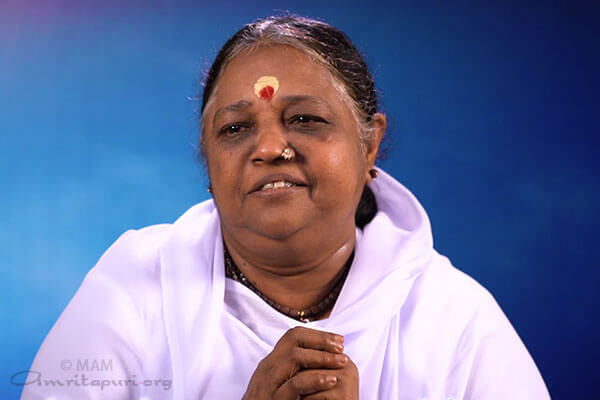24 May 2020, Amritapuri
~from Amma’s message during corona times
Once when Amma was on the North Indian tour, we broke the journey and stopped to have lunch. Food had been prepared. Almost 500 people were in the tour group. We looked for shade. There was a place with a tree and we stopped there. This tree was regarded as a sacred place, as a mahatma had practised his ascetic penance here. People were circumambulating the tree. They then waited for a breeze to come so that a few leaves would fall from the tree. They would then pick up the leaves with great reverence and carry it with them as prasadam to worship in their puja rooms. Amma was very touched seeing this. And Amma wished people would respect every tree and plant in this way. Then this world would become heaven.
If humans protect the creatures on earth, these creatures will protect humans as well —just as it is said that those who safeguard dharma will themselves be protected by dharma.
The coronavirus is a wake-up call. It is true that these are trying times. But we should try as hard as possible to remain cheerful and happy. At the same time, maintain a high level of alertness. This is our responsibility. Remaining cheerful in the face of difficulties does not mean suppressing unhappiness we may feel. It doesn’t mean to suppress; it means to surmount. The best way to preserve the mind’s state of happiness is to become engaged and immersed in some useful activity.
We should try to see others’ pain as our own, see them as a part of ourselves, and establish a heart-connection with them. In one way, this is the best occasion to turn inward. Many of us are following events closely on the Internet. But this alone is not enough. For a brief time, try to look into the “Inner-Net” as well. This is a good time to try and understand ourselves. Physical exercise is needed at this time. Yoga is good for this. Practice meditation. Read spiritual books.
Household appliances such as a blender come with an instruction manual telling us how to use them. It instructs us on how to use the machine, with cautions such as not to keep it on for a long time as the motor may burn up. Other appliances and devices also come with their own operation manuals. In the same way, spirituality is the instruction manual for life. It teaches us how to manage our life. We have to heed these spiritual instructions. If we read and understand spiritual books, we will be able to remain happy and content with what we have. We are not candles that depend on someone else to light them; we are the self-effulgent sun. You are not helpless, lost kittens; you are brave, roaring lion cubs.
The bounty of this earth is not meant to be enjoyed by human beings alone. All creatures have a right to it. Similarly, future generations also have a right to it. Due to selfishness and the pressure of circumstances, we often fall into the temptation of looking only at a temporary gain. It is essential that we overcome such temptation.
Amma remembers a story: A man was going on a pilgrimage. Someone stole his bag with his wallet, food and clothes. Soon he became very thirsty. In the far distance, he saw a well, slightly up the hill. He slowly began to walk towards it, dying of thirst and fatigue. Finally, he reached the well. He became very happy. He began to pump the handpump. But not a single drop of water came out. Frustrated and dejected, he almost collapsed when something caught his eye. A small pot lay to one side of the well. He quickly picked up the pot and saw a little water in it. As he was starting to drink from it, he noticed a paper with some writing stuck on the pot. It said, “Pour this water in the handpump before pumping water. The handpump will start working. After you take what you need, don’t forget to keep a little water in this pot for the next thirsty traveller who comes this way.”
For a moment the traveller stood bewildered. He was dying of thirst. He thought, “What if I pour the water in the pump and it doesn’t work? Then I will lose even the little water there is. Should I pour it? Or should I drink it? I am really dying of thirst. But if I don’t pour this water in the pump and draw some water from the well, it will be a crime against the next thirsty person who may come here.”
It was an internal struggle between his selfishness and his concern for his fellow beings. Finally, his concern won and he poured the water into the hand-pump. To his delight, the hand-pump worked and poured out cool, clear water.
He drank to his heart’s content and filled the pot at the end.
What do we learn from this story? It teaches us to take what we need while being considerate to the next needy person at the same time. It teaches us to realise that others feel the same pain as we do.
We should understand this and try to cultivate an attitude of surrender and consideration for others.

